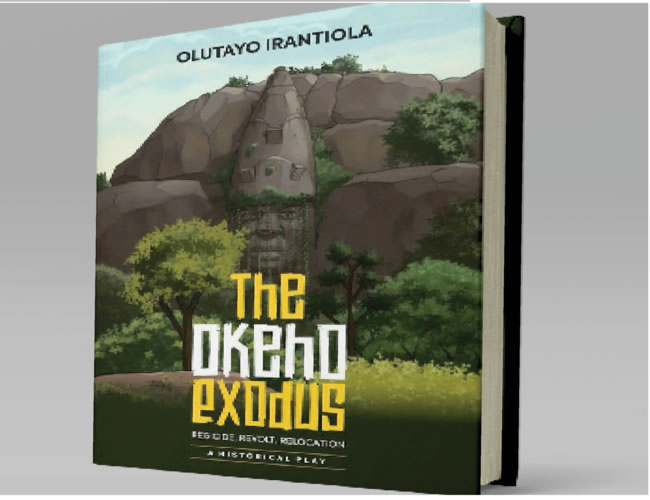A review of Olutayo Irantiola’s play, The Okeho Exodus by Akeem Akinniyi
Olutayo Irantiola’s The Okeho Exodus is a historical play set in 1916 but written in a modern-day language and filled with elements that will not alienate a reader in these present times.
The play revisits the past of the descendants of Okeho who resettled among the hills along with 10 villages to stem the tide of invasion by the Dahomey and Fulani. What follows are intrigues of betrayal, and bastardisation of culture by colonialists which eventually leads to the tragic end of not only the king but the loss of the town’s sovereignty to the colonial masters.
The theme of betrayal dominates the play and the only character who survived it is Oba Arilesire who built a harmonious home of settlers which sets the tone for successive kings before the turn of Onjo Olukitibi.
The emergence of Captain Ross and his fellow conquerors in Okeho with their laws and subjugation of the people leads to distrust among the chiefs and set the plot to oust the king, Onjo Olukitibi.
A wave of betrayal rises among the chiefs who think Onjo Olukintibi has sold them out to the colonialists referred to as ‘Ajele’ (a Yoruba word for usurpers).
The internecine fighting grows beyond the borders of Okeho and extends to other towns as Balogun Olele seeks allies from far and within against the king.
In the end, the king is captured and annihilated along with his family. Captain Ross avenges the death of the king, attacks, and arrests the chiefs to bring law and order to Okeho, thereby establishing the sovereignty of the colonial masters.
The play deploys antithesis effectively to strike a balance in the events as well as the lives of the characters and the passing of the years.
Oba Arilesire’s reign is filled with harmonious living and unity among the people. He would go on to die peacefully in his sleep. This is contrasting to the reign of Onjo Olukintibi whose reign ends in disarray with mistrust in the air and would later die agonizingly in the hands of his own people.
Another is the replacement of invaders, at first, it is the Fulanis and Dahomeys whose aggression make the people of Okeho flee to the new place.
Little had they settled down when the colonialists invaded their space and sadly, it will result in their return to the place they left earlier.
The challenges of colonialism to traditional laws and customs are symbolised by the emergence of Captain Ross whose influence and power conflicted with Onjo Olukintibi, thereby reducing his relevance before the people. His authority is challenged, and as Captain Ross’ influence grows, Olukitibi’s stature shrinks.
The people of Okeho begin to see him as the puppet of the white man. An example is the statement of Oladunni (41) “The reign of Olukitibi is already disheartening. We have never experienced this in Okeho Ahoro, I have been watching with keen interest and I am getting to lose hope in his leadership abilities.”
“People have been saying it that Olukitibi was not the right person to be crowned, he was imposed on us by the colonial masters. But will the kingmakers and the oracle lie?”
The theme of betrayal echoes through the book and it is expressed in many ways Jinjin represents the modern, inquisitive, and courageous woman who believes in equality.
READ ALSO FROM NIGERIAN TRIBUNE




